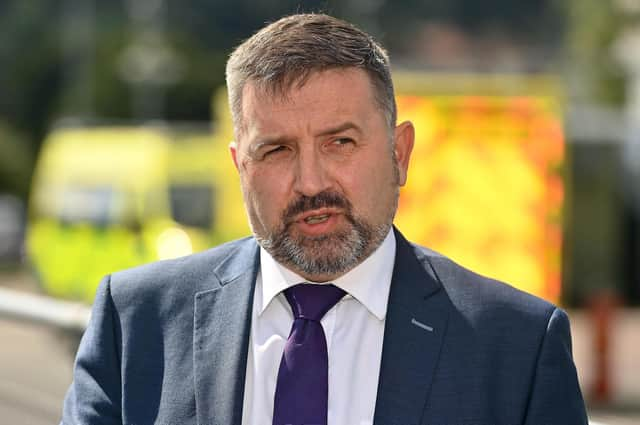Stormont rejects extending 'anti-democratic' Covid powers on health - but keeps them for courts


The Assembly on Monday overwhelmingly rejected health minister Robin Swann’s request to retain the powers to introduce emergency public health legislation of the type used during the coronavirus lockdowns.
Robin Swann withdrew two of the motions before they were due to be debated, saying that there was no legal necessity to bring them. 7 MLAs backed his remaining motion to retain powers to make domestic and international travel restrictions, but 65 voted against.
Advertisement
Hide AdAdvertisement
Hide AdMinister Swann said that if the laws were not passed there would be a risk NI could not respond to a new variant.
The opposition SDLP MLA Colin McGrath said it was “a difficult motion to support” as all MLAs had said when they were introduced that the laws were anti-democratic, but necessary in the circumstances. He said under the powers a decision could be made by ministers and it would be weeks before MLAs could scrutinise them. He highlighted the fact a £28bn budget could be passed in two days, and questioned why if there was a health emergency, the same couldn’t happen.
"It was needed then, we don’t need it now”, said Mr McGrath.
The DUP’s Diane Dodds said the public were told that the covid powers wouldn’t be kept longer than necessary, asking: “I wonder why we would want to retain legislation like this on our statute book”. She said the DUP were extremely uncomfortable with the legislation and want a permanent solution and would not back the minister’s proposals.
Advertisement
Hide AdAdvertisement
Hide AdThe UUP’s Alan Chambers said the situation wasn’t ideal – but pointed to the two year collapse of the institutions as a reason no alternative legislation was yet in place.
Minister Swann said that he has no plans or desire to introduce restrictions, but it is only sensible that ministers are able to respond to potential variants. Without extending the powers, the minister said there was a risk authorities couldn’t respond to events to protect public health.
Powers under Section 48 and Schedule 18 of the Coronavirus Act 2020 will not now be extended – and no such powers will be available to the executive until a public health bill is delivered. That may take until autumn to be completed.
However, justice minister Naomi Long did get approval from the Assembly to extend emergency covid laws which allow the wider use of live links by courts. She said this was a temporary but necessary measure until new specific legislation can be brought – and confirmed that future extensions will be necessary.
Advertisement
Hide AdAdvertisement
Hide AdDUP Justice Committee Chair Joanne Bunting said she was concerned at the continued extension of coronavirus legislation and that there should not be a reliance on emergency laws passed during the pandemic.
When the powers were initially taken by Stormont, the then head of the Northern Ireland Human Rights Commission (NIHRC) Les Allamby said: “The powers taken locally in this case are being kept under review and, as soon as the Department of Health considers the restrictions are no longer necessary to control the spread of the coronavirus infection, they should be ended”.
Comment Guidelines
National World encourages reader discussion on our stories. User feedback, insights and back-and-forth exchanges add a rich layer of context to reporting. Please review our Community Guidelines before commenting.